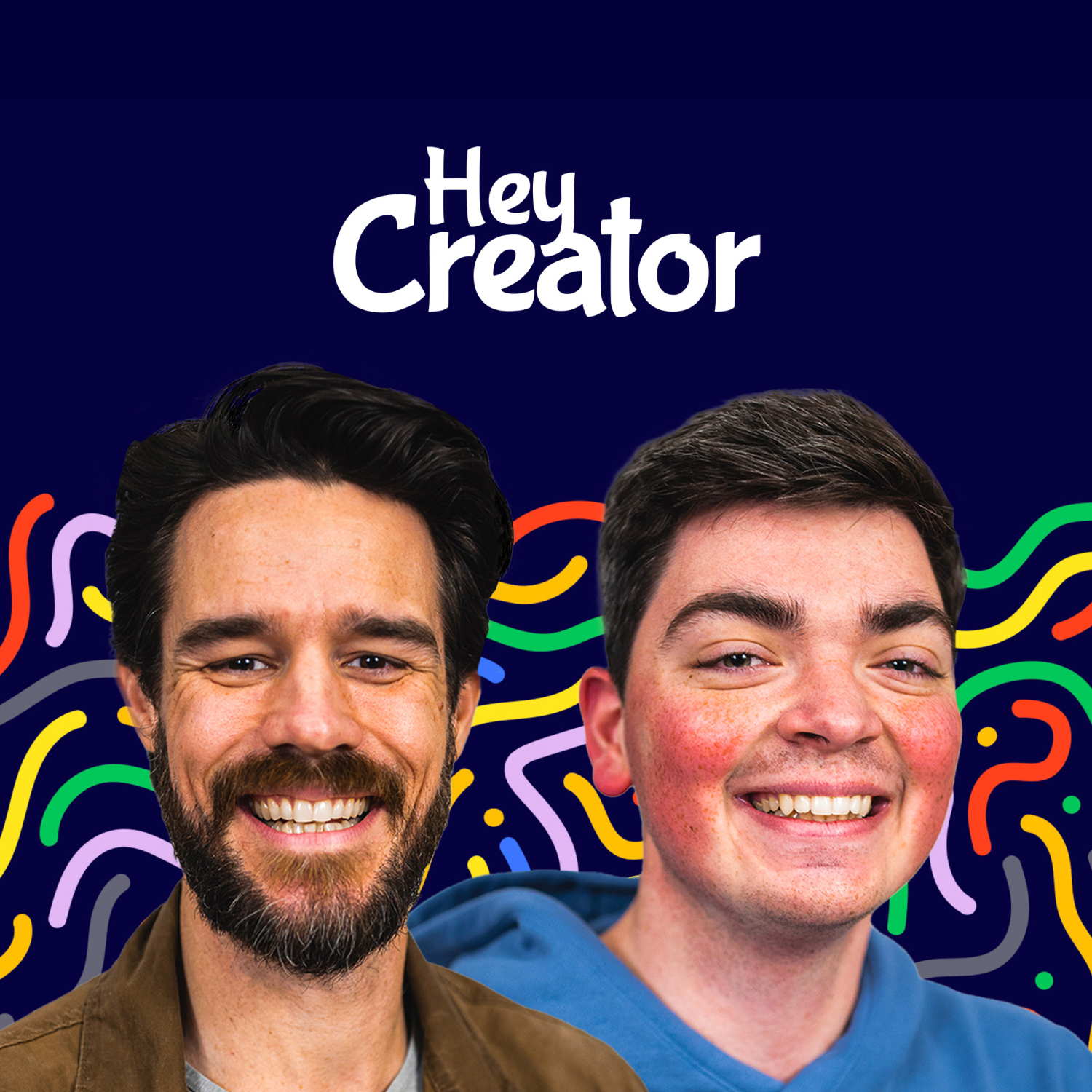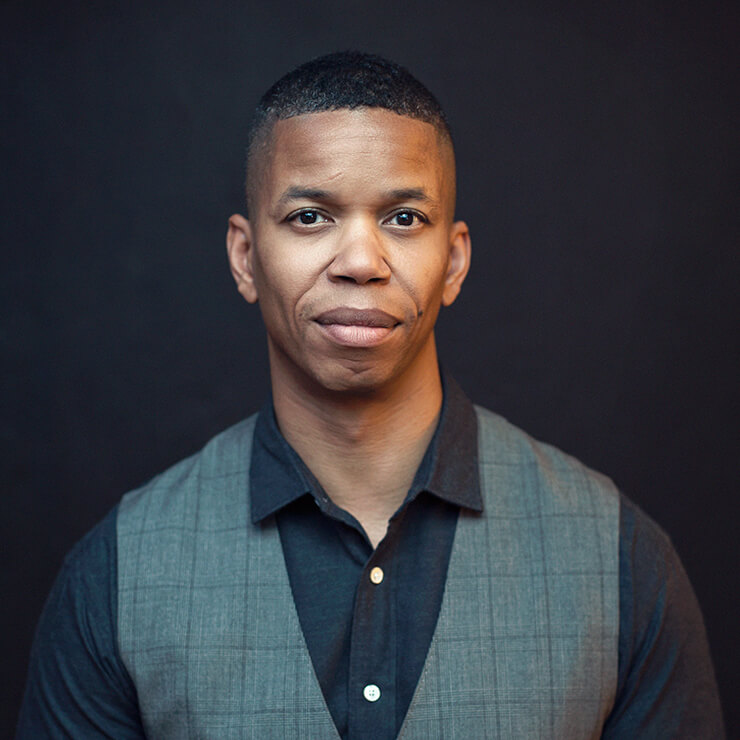[00:00:00] Matt Ragland: If you’re a creator who feels like you’re getting in your own way or aren’t where you should be yet, then today’s video is for you. Recently, I was joined in the HeyCreator community by Corey Wilks, a psychologist and executive coach who helps people like you and me get unstuck. He gave an excellent presentation on the four horsemen of fear that will help you understand how to get out of your own way and get past your limiting beliefs.
[00:00:25] Corey Wilks: I’ve worked With a lot of different entrepreneurs, creators, you know, CEOs, people from all different walks of life. And probably the most famous person I’ve worked with who’s publicly endorsed that we’ve worked together is Ali Abdaal, right? Bestselling author, big time YouTuber, things like that. And all around just awesome dude, right?
With all these people I’ve worked with, either I’ve personally worked with them or friends and things that I’ve seen around, I noticed a very specific pattern. A lot of people. They like to think that lack of money, lack of intelligence or lack of resources are what’s holding them back. Right? Like if only I knew more, I would be able to succeed.
If only I had more money, then I could start my YouTube channel, all these things. And that just isn’t the case. Most of the time, typically the things that hold us back are limiting beliefs, right? Cause like at this point in, in, you know, yeah. If you have internet access, you can typically overcome a lot of these other lack of resources, intelligence, whatever, right?
Plenty of people have achieved incredible success with very, very little means. Okay. So it is generally not these things that hold us back, but our actual limited beliefs, what I consistently see is that the most common limited beliefs that hold creators back fall into one of four categories, which I call the four horsemen of fear.
So the first one is one, probably everybody here is familiar with, which is fear of failure, right? And this horseman says, well, what if I’m not good enough? What if I can’t make this work? And the issue with fear of failure is that it keeps us from ever starting. Right? Like if I assume this isn’t going to work, why would I ever even try?
The second one is fear of ridicule. And this is where we’re so preoccupied with what other people may or may not think or say, right? What if people judge me for doing this? What if they don’t like it? How will my friends and family respond? This is especially common for a lot of creators, especially early on in their journey, because it’s like, well, my face is going to be out there.
It’s going to suck. Like my early content is going to be super cringy and I’m afraid of what my coworkers might think. My, you know, maybe my wife, my friends, my whoever, and the issue with this is fear of ridicule tricks us into staying small and never taking a chance because we’re so afraid of hell. You know what they quote unquote, whoever they is, we’re so afraid of what they might think or say that we’re not true to ourselves.
We never actually put ourselves out there. The third one is fear of uncertainty. And this one basically says, well, which decision is right? What if I, what if I choose wrong, right? Like which direction should I, I pursue. And we’re so afraid of making the wrong decision. We ended up making no decision. Fear of uncertainty paralyzes us in a constant state of over analysis, right?
This is where we go down endless YouTube rabbit holes of, well, I want to start a YouTube channel. Okay, well, which of the 50 different cameras should I get? Well, what about this microphone versus that one should I go with? You know, Adobe premiere or final cut or DaVinci resolve or, or this, like it’s the endless YouTube rabbit holes because we’re uncertain.
And we think, well, I have to wait until I feel ready before I take action. This is the fear of uncertainty. And the fourth one, which trips up a lot of people, which doesn’t necessarily make sense at first is fear of success. And this is where you may think, well, Corey, Why would I be afraid to achieve the thing I claim to want?
And for a lot of us, success represents crossing a threshold. If you’ve never achieved major success, however you define success, then there is a before success version of you and an after success version of you. Well, if you’ve never achieved success, the only version of yourself that you know is pre success, right?
And we reflexively sort of back away from things we don’t understand. Well, I don’t understand what post success me looks like. So I can reflexively kind of back away from succeeding. If I succeed, maybe I lose my ambition. What if it means I’ve peaked in life, right? What if I can’t handle the level of influence and responsibility, right?
Some of the things I’ve heard from, from some of the, the creators and entrepreneurs I’ve worked with is like, I’ve been the underdog my entire life. If I succeed. I’ll succeed. I’m not the underdog anymore. And being this gritty underdog has always been my superpower. And I’m afraid that by succeeding, I will lose what makes me unique.
What makes, you know, what, what drives me, my superpower, or I’ve also heard like, well, if I really succeed, I could become niche famous and then people in my niche would hang on my every word. And I just don’t feel that I’m prepared to handle that level of influence and authority. And when fear about. Of success is our major issue.
It tends to trick us into abandoning our path, right? When we’re on the edge of victory, right? So if you have a track record for doing really well and, and just kind of nailing everything, but then for some reason, consistently, right, when you’re on the edge of victory, something always seems to happen that pulls you away from succeeding, it could be a fear of success.
So if you can real quick, drop in the chat, which horsemen are you currently And the reason I ask this question is it’s really easy to think that you are the only person struggling with your current fear and consistently that is just never the case. So many of us struggle with at least one of these on a day to day basis, especially when we’re doing things that matter to us.
The issue is most of us aren’t aware of the four horsemen. We are aware of our self sabotaging behaviors, but the horsemen actually hide it. In these self sabotaging behaviors. So things like procrastination, perfectionism, imposter syndrome, complacency, like laziness, right? These are the things that people understand they struggle with.
And these are the things that people look to productivity advice for help with. But productivity advice typically doesn’t actually help you with these, because I’m sure if any of you struggle with any of these things, you’ve probably read all the productivity advice you’ve, you’ve read how to do an Eisenhower matrix or time block or Pomodoro or 80, 20, yet you continue to struggle with these issues.
And there is a very specific reason. Most productivity advice doesn’t work. They are not helpful if fundamentally your issue is that you’re afraid of something. So psychologists, the way we, we uncover the purpose or the function of the self sabotaging behaviors holding you back is what we call a functional analysis.
And it sounds fancy and complicated. It’s really not. Literally, all you do is you look at a given behavior and you say, what function does this serve? What purpose does it have? And for most self sabotaging behaviors, they serve the function to help us avoid facing something we’re afraid of. So procrastination isn’t really your issue.
You procrastinate because you’re afraid of failing. Okay. So let’s say I’m, I’m getting ready to launch something, a new project, a new course, a new landing page, a new offer, whatever. If fundamentally, I am afraid that this isn’t going to work, that people aren’t going to buy it or they’re going to, you know, maybe make fun of me or whatever.
It just, it isn’t going to work. Then the longer I procrastinate, the longer I avoid risking that failure. Okay. The more I postpone my launch, the, the more I kind of tinker and, or the more I get, I allow myself to get distracted with other like side projects that is serving the specific function to help me avoid something I’m afraid of, which in this case could be fear of failure.
Okay. So a lot of times these are just all fear avoidance strategies. Perfectionism and imposter syndrome are largely sort of two sides of the same coin. Perfection in life doesn’t exist, right? Like nothing in life is perfect. Well, perfectionism is expecting yourself to attain the unattainable, right?
Cause you’re saying until this is perfect, I can’t launch it. I can’t put it out there. Well, nothing is perfect. So you waiting to feel ready or waiting for this to be perfect is actually allowing you to avoid facing potentially this, this ridiculous judgment, or this something else. And these are not neat categories like, you know, perfectionism for you may serve the function, um, To help you avoid fear of success or fear of uncertainty, right?
Like these are just examples. And imposter syndrome fundamentally is a belief that you don’t belong in the room. If I put this out there, everybody else is going to judge me. They’re going to say that, you know, they’re going to know that I’m, I’m not an expert or that I’m not smart enough or that I don’t belong here.
Right. Well, what is that? Fundamentally, that’s a fear of ridicule. That’s a fear of how other people might react or judge. So then as long as you just don’t go into that room, you don’t put yourself out there, then you avoid risking that ridicule. Same thing with complacency and laziness and things. It’s just like, laziness is rarely actually the issue for most people.
It is that laziness or that complacency is helping you avoid Something, right? I would rather say, Oh, well, I could have done it. If I really wanted to, I would rather do that than risk making the wrong decision. I’m so afraid of uncertainty. I’m so afraid of not feeling prepared. I would rather convince myself that I don’t actually want it in the first place.
This is why a lot of pro productivity advice. Tends to fall flat for people, despite productivity advice being super helpful. It just isn’t helpful when fundamentally your issue is fear. Logically, the next question is how do we actually overcome the four horsemen of fear and the simplest, most effective exercise I’ve found is what I call fear inoculation.
Now I’m a psychologist. I did not go to medical school. I’m not that kind of a doctor. However, my very elementary understanding of how inoculations or vaccines work is you introduce a little bit of the bad thing in a controlled safe environment so that you can build up a tolerance or an immunity in case you ever come across the real bad thing out in the world.
A gross oversimplification I’m sure. So here’s how fear inoculation works. Assume your worst fear comes true. Assume you fail. Assume you succeed. And you know, you start getting corrupted by power and influence. Assume people make fun of you. Assume you make the wrong decision, whatever this worst case scenario is.
Assume your worst fear comes true because the issue a lot of us fall into is. We get into the cyclic, you know, asking the rhetorical question over and over again of, well, what if I fail? What if people make fun of me? What if people say this? What if this happens? But whenever I actually answered, we keep it as a rhetorical, the cyclic questioning.
What if, what if, what if with fear inoculation, we’re actually going to answer this question. So assume your worst fear comes true and then write down what it looks like for your worst fear to come true. Like really flesh this out. What does your worst case scenario look like? Okay, does this mean I launch a thing and nobody buys it?
Does it mean I published this video and I get a lot of hate and trolls and critics in my comments making fun of me or tearing something down now with that assumption in place, how will you deal with it? actually answer that. Let’s say fear of failure is your biggest issue. Okay. Let’s assume you fail.
How will you learn from your failure, from your experience and actually iterate, right? Did you maybe not have product market fit? Did you not validate your idea before you built it? Right? Can you potentially next time do a presale? So that way you only build it. If people buy it beforehand, were there risks you reasonably could have taken that you didn’t, right?
Or risks you reasonably should not have taken that you did, where you may be a control freak and the fact that you refused to delegate or outsource, did that contribute to your failure? Were there resources you could have taken advantage of, but didn’t, and then that led to your failure? Right. Really break down what led to your failure that you can then try to reverse engineer, try to avoid or overcome, let’s say ridicules your issue.
Okay. You do something and everybody makes fun of you. Everybody hates it. What’s your strategy? The biggest thing with this is really thinking about are these opinions worth caring about in the first place? So there’s this rapper’s name is Nipsey Hussle and he has this quote. He says, you will never be criticized.
By somebody doing more than you, you will only ever be criticized by somebody doing less than you. So all these people you’re so concerned with of how they might react, are their opinions worth caring about in the first place? Are they actually building things that inspire you? Are they actually doing anything at all with their lives other than complaining on the internet?
And trying to tear everybody else down because what you will typically quickly realize is that the people who are legitimately in your corner are not going to try to tear you down. And the people tearing you down are 1000 percent not actually in your corner. Maybe fear of uncertainty is your issue.
Okay. You were so afraid of making the wrong decision. You ended, you ended up making no decision. You stagnated and you’ve made no progress and it’s been two months or three months. Okay. How are you going to recover? How can you maybe rather than constantly researching and thinking and planning and talking, But not doing how can you pursue minimum viability, right?
There’s this whole concept of just in time versus just in case learning, just in case learning is just randomly collecting bits of information. Like maybe you’ll be on jeopardy one day. Like, Oh, I’ll learn this just in case I ever need it versus just in time is I am actively building something. thing, but I’ve hit a roadblock that I need more information on.
So let me find this new bit of information just in time so that I can continue moving forward. And then I keep doing that until I hit the next roadblock and then I learn a little bit more just in time to keep moving forward. How can you focus on pursuing progress rather than perfection that can help you overcome this analysis, paralysis, and this uncertainty and success.
Assume you succeed. What is on the other side of success? How will you address it, right? How can you maintain your humility so that you don’t become corrupted by power and influence? How can you surround yourself with other successful people so that you can challenge yourself and they can challenge you so that you don’t feel like you’ve peaked in life or you lose your ambition?
Right. How can you learn to see this first success as the first mountain that is at the beginning of the mountain range? Because what you find is most people, after they achieve major success, they go on to continue to achieve other major successes because they then realize, Oh, I am so much more capable than what I thought I was initially.
So then success isn’t nearly as terrifying because you’re like, Oh, yeah, if I succeed, I know what How I, how I will recover or how I will react to that. What is your strategy to overcome your current fear? Right? Earlier we talked about what horsemen you’re struggling with the most right now. We’ll run that through fear inoculation.
Assume your worst fear comes true with that assumption in place. How will you recover? Ultimately, we fear the unknown. If you think about, even like people who are like afraid of the dark, you’re not afraid of being alone in the dark, you’re afraid of not being alone in the dark and not knowing it, right?
As soon as you turn the lights on, you’re no longer afraid. Well, it was the unknown of what could have been in the dark with you. Fundamentally, as humans, we fear the unknown. In any respect, what if I die? What if there’s a monster under my bed? What if I fail? What if people make fun of me? What if I succeed and it changes me?
Fear inoculation helps make the unknown known or at least knowable. And this robs the horsemen of their power over us. Okay. And when we think about self sabotaging behaviors, if my procrastination for me serves the function to help me avoid my fear of failure, if I run it through fear inoculation. And then I realized, Oh, if I fail and my worst case scenario happens, this is how I will recover.
Well, now that I feel like I know what is going to happen and I feel comfortable, I have conviction, courage, belief that even if I fail, I will be fine afterward because I know what I’ll do. I am no longer nearly as afraid of failure. And because I’m not afraid of it, I don’t have a need to avoid it. And that helps my self sabotaging behaviors, my procrastination, perfectionism, whatever, start to reduce, to minimize, to subside, to potentially altogether go away because it no longer serves a function.

























